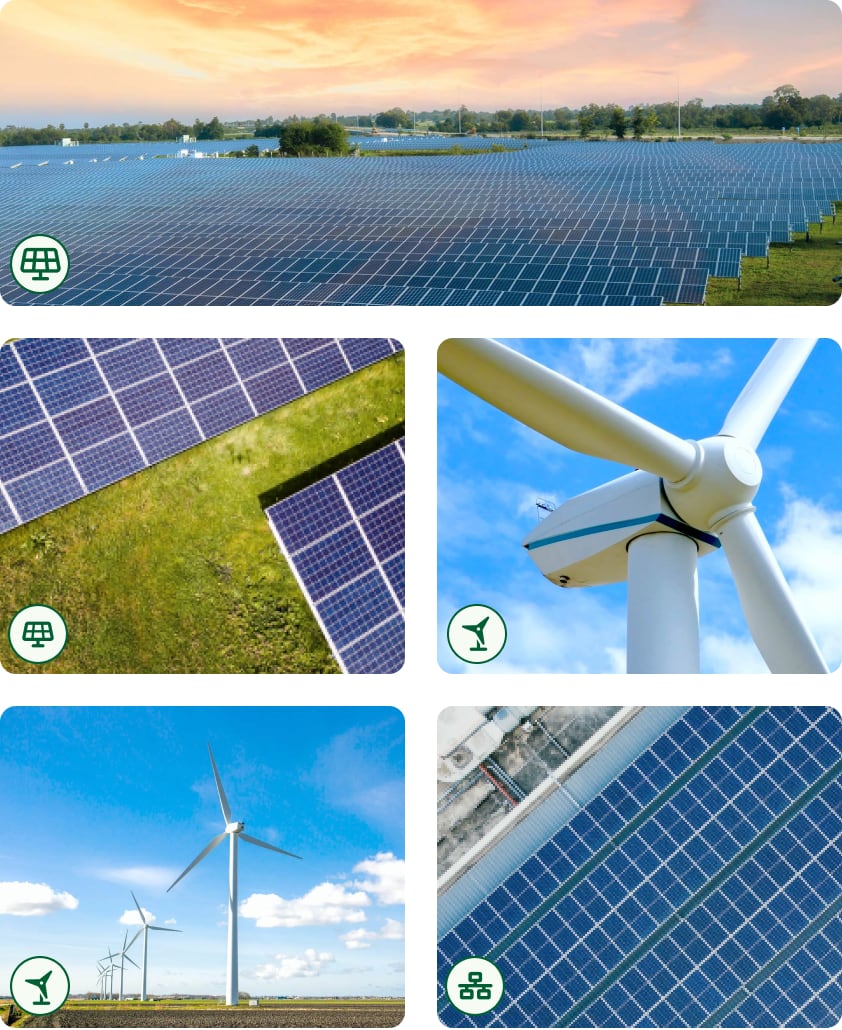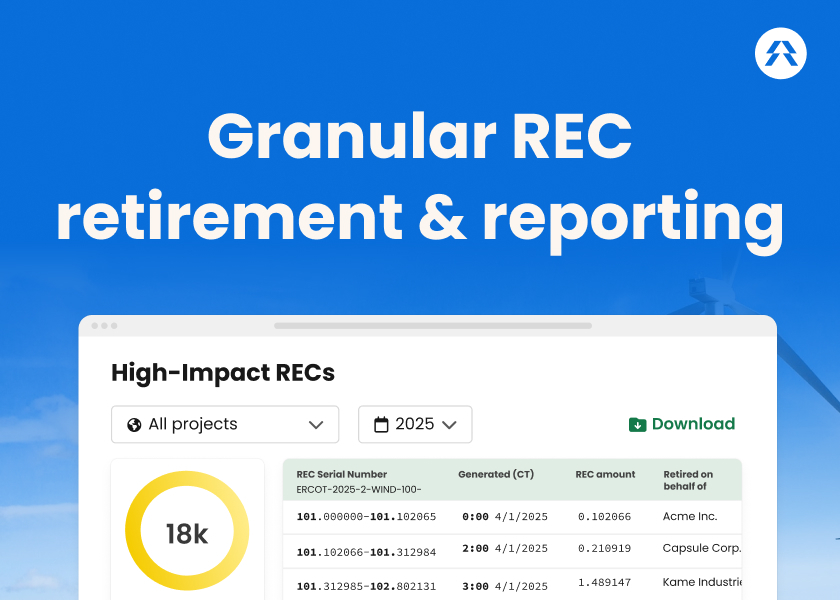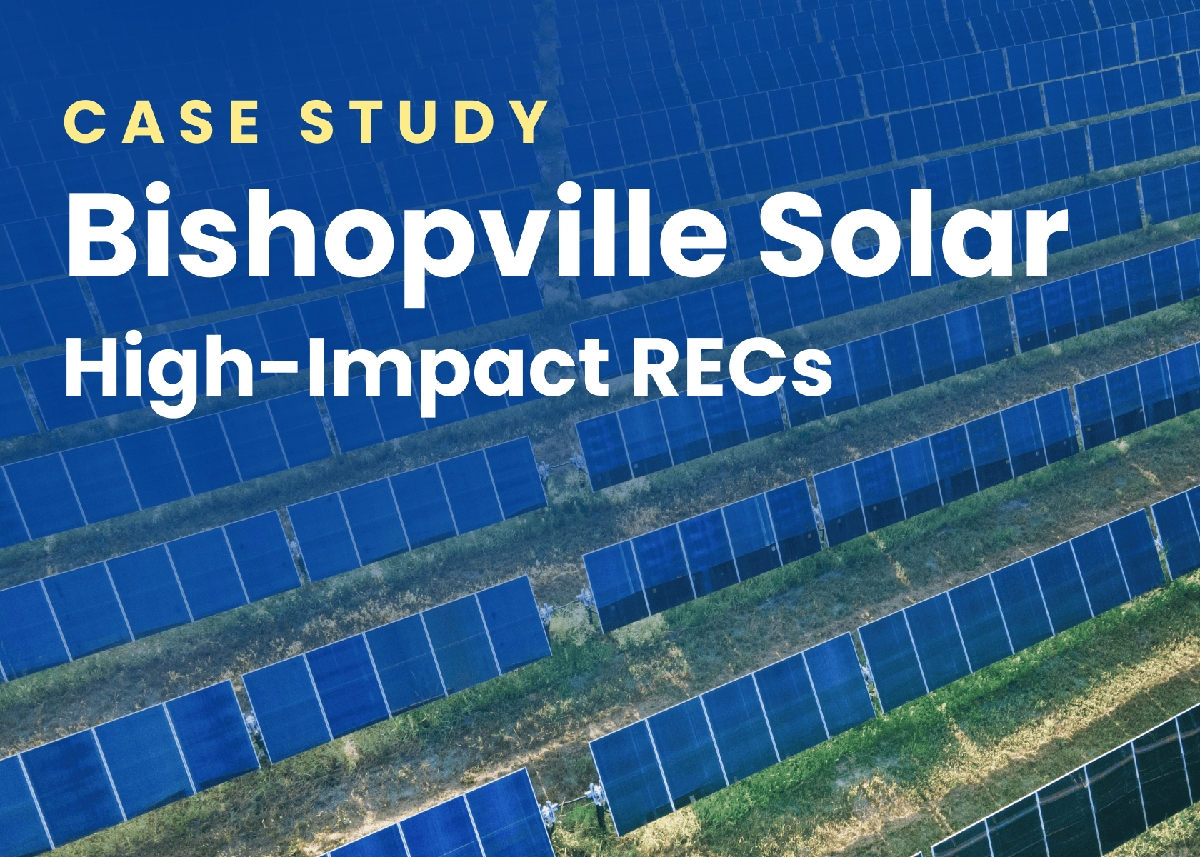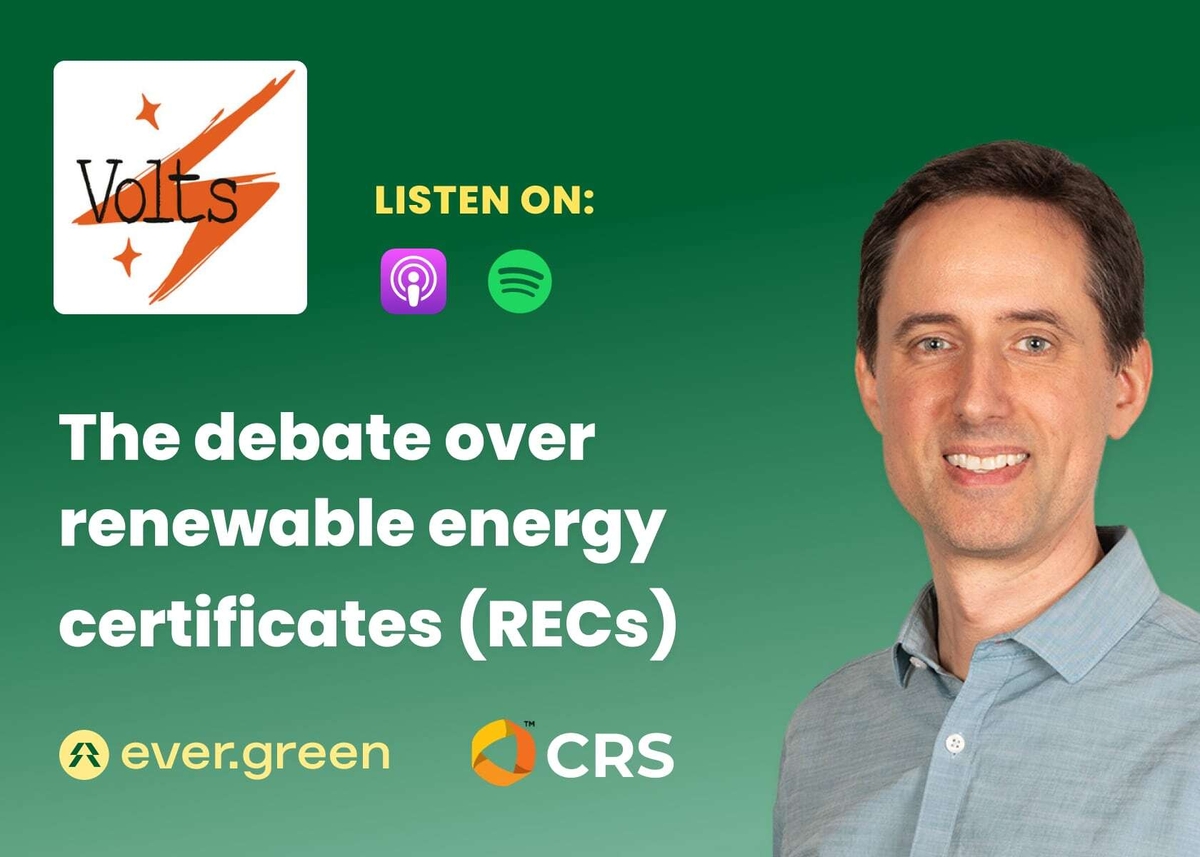High-Impact Renewable Energy Certificates (RECs)
Reduce your Scope 2 emissions with integrity and ease.
What are High-Impact RECs?
High-Impact RECs go beyond traditional renewable energy certificates. Unlike spot-market RECs, which typically come from existing projects, High-Impact RECs are proven to make a material impact on new clean energy being added to the grid. This is referred to as “Additionality.”
By investing in High-Impact RECs, companies ensure their commitments have a verifiable impact on supporting new clean energy generation while also meeting their own sustainability goals. They also offer financial and reputational advantages over standard RECs.
Why Does Additionality Matter?
Drives New Renewable Energy
Additionality ensures corporate buyers are funding projects that wouldn’t have been built without the committed REC revenue, accelerating the transition to a clean energy grid.
Supports Decarbonization Goals
Companies with science-based targets (SBTi), RE100 commitments, or CDP reporting requirements must show real impact. Additionality attestations ensure their purchases are compliant with these guidelines.
Ensures Credible Claims
Extensive due diligence around the REC contract’s financial materiality protects against the type of reputation risk faced by spot-market REC buyers accused of greenwashing.
Trusted by


The Case for High-Impact RECs
High-Impact RECs combine ease of procurement with the impact of a VPPA, making them a strong choice for any company seeking real renewable energy impact.

Predictable Pricing & Risk Management

Provide budget certainty
With fixed-price, long-term contracts (5-10 years)
Hedge against higher REC prices
As demand rises to meet 2030 targets.
Boost financial performance
With demonstrated ESG commitments.
Weather Market & Policy Shifts

Stay competitive amidst growing corporate demand
Especially from data centers and tech firms.
Reduce exposure to market shifts
Federal incentives and standards body changes drive uncertainty.
Align with Scope 2 reduction best practices
using High-impact RECs forward contracts.

Increase Brand Credibility & Reputation

Avoid greenwashing concerns
With transparent, verifiable impact.
Build trust with customers, investors and employees.
Point to outcomes from the specific projects you’ve backed.
Practice sustainability best practices
Comply with the purchase criteria set by major standards bodies.
Get started with High-Impact RECs

Set Your Sustainability Goals
Set clear targets aligned with RE100, SBTi, or internal corporate sustainability commitments.

Compare Renewable Energy Options
Evaluate the financial and reputational impact of different procurement options, considering factors like additionality, price stability, and contract length.

Define Your Procurement Strategy
Determine which solution(s) fits best into your broader sustainability approach. Decide on procurement model, volume, budget allocation, and timeline.

Secure Internal Buy-in
Build a business case by leveraging market trends, financial advantages, and reputational benefits to gain leadership support.

Execute
Select projects and finalize agreements based on your procurement strategy.

Tell Your Story & Monitor impact
Showcase your commitment to renewable energy, track progress towards sustainability goals through continious monitoring, and integrate impact into your corporate sustainability reporting.
Ever.green case studies
High-Impact RECs
SC
Solar
Bishopville Solar
Ever.green helped unlock 28MW of solar power by connecting a mission-driven developer with corporate buyers to unlock long-term revenue needed to finance this project and bring it online.
View case studyClean Energy Tax Credits
AR
Solar
Ralston Family Farms
Ever.green matched Ralston Family Farms with a buyer and guided the deal from start to finish, making it easy for both sides to benefit from clean energy tax credits.
View case studyThe Ever.green Advantage
Ever.green makes investing in High-Impact RECs simple, transparent, and impactful. We provide end-to-end support to ensure credibility, maximize sustainability benefits, and streamline the process.
Access High-Quality, High-impact RECs
Directly fund new yet-built renewable energy projects.
Get fixed pricing and clear contract structures.
Fractionalized RECs
Accessible to all company sizes with a minimum of 1,000 MWh/yr.
Requires at least a 5-year forward commitment.
Rigorous Project Diligence
Legally backed additionality claims.
Projects scored on Ever.green’s Impact Scorecard to maximize environmental impact and local community benefits.
REC Retirement
End-to-end REC retirement management across national REC registries.
REC timestamping and emissionality calculations.
Marketing Assist
Bespoke toolkit with project videos, photos, and sustainability report content.
Partnership on press strategy & media outreach.
Frequently Asked Questions
Who can buy RECs?
In practice, anyone can buy RECs, and in fact many individuals receive renewable energy credits from community solar projects or are allocated them by their utilities. Generally, however, Ever.green works with companies, nonprofits and other organizations that need to purchase RECs to meet their sustainability goals.
How can RECs help me meet my sustainability goals?
When an organization looks to reduce its greenhouse gas emissions, it has to evaluate three different categories of emissions - Scope 1, Scope 2 and Scope 3.
- Scope 1: Direct emissions (e.g., emissions created by the organization’s own manufacturing facilities, or from vehicles needed to provide the Company’s services)
- Scope 2: Indirect emissions attributable to the Company’s energy use.
- Scope 3: Indirect emissions attributable to the Company’s supply chain and customers.
RECs can most directly help an organization using power from the electric grid to address its Scope 2 emissions. Each REC represents the purchase of 1 MWh of renewable energy. Generally speaking, if an organization purchases a number of RECs equal to its energy use for a given year, then under current “market-based” accounting rules approved by the Greenhouse Gas Protocol, it is allowed to claim zero Scope 2 emissions for that year.
Are Ever.green RECs Green-e® certified?
Ever.green RECs are Green-e® Energy certified, and meet the environmental and consumer-protection standards set forth by the nonprofit Center of Resource Solutions. Learn more at www.green-e.org.
For more information about Renewable Energy Certificates (RECs), see: www.green-e.org/rec.
How do I buy Ever.green RECs?
As noted above, Ever.green RECs are only sold through forward commitments. If you see one or more REC projects on our marketplace that you would be interested in supporting through a long-term REC purchase, please contact us and we can begin the process of onboarding you as a customer before presenting you with a draft forward purchase agreement for review.
Generally, our contracting process involves back-to-back agreements with developers and end-user customers. We will enter into forward purchase agreements for RECs directly from developers on new or repowered projects, after completing a diligence process. This forward purchase agreement will also contain representations backing up the high-impact nature of the RECs. Prior to, or concurrent with, the commencement of the project’s commercial operations, Ever.green will resell those high-impact RECs as Ever.green RECs under forward purchase agreements with end customers.
One exception to the above is if an existing customer contract is terminating, but Ever.green remains committed to purchase RECs from an existing project, Ever.green may contract with a new customer to resell the newly available REC stream. We view these as RECs as still having high impact because the developer relies on the continued revenue stream from the REC sales at the time of construction to guarantee the viability of the project, and Ever.green relies on the new end-user customer to enable it to meet its obligations to the developer.
Ever.green Insights on High-impact RECs

Refurbishing Ocotillo Wind Farm

Watershed partners with Ever.green

Greenwashing or not? Not all RECs are created equal
Add clean energy tax credits to bolster your sustainability strategy.
Add Ever.green clean energy tax credits to your REC purchase and use your tax savings to help subsidize or entirely erase the cost of RECs.

2023 IRA Tax Credit Market Wrap-Up

Baker Tilly Joins Ever.green's Marketplace











